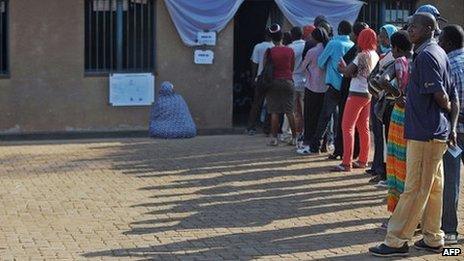Rwanda election: RPF wins parliamentary landslide
-
Published

Rwanda's governing RPF party has won a resounding victory in parliamentary elections, securing 76% of the vote.
The party of President Paul Kagame, which came to power after the genocide of 1994, won 40 of the 53 seats directly elected on Monday.
The opposition FDU-Inkingi, whose leader Victoire Ingabire is in jail, did not take part in the election, as it is not officially registered.
Two other parties regarded as close to the RPF took 13% and 9% of the vote.
Voting took placed days after two people were killed in two grenade attacks in the capital, Kigali.
No group has said it carried out the attacks but officials have blamed the rebel Democratic Forces for the Liberation of Rwanda (FDLR), which is accused of links to the 1994 genocide, and critics of the government recently exiled in South Africa.
The Rwandan Patriotic Front (RPF) government has been praised for maintaining stability and overseeing rapid economic growth since the slaughter of some 800,000 minority ethnic Tutsis and moderate Hutus.
But President Kagame has been increasingly accused of ignoring human rights and stamping out any opposition.
The RPF has kept its parliamentary majority but lost two seats.
A third opposition party to contest in the election, PS-Imberakuri, did not win any seats.
Its officials told the BBC that their supporters were harassed during the campaign - charges rejected by the RPF.
Helped by quotas, Rwanda has been the world's only parliament where women form a majority.
The parliament has 80 seats, 24 of which are reserved for women, two for candidates representing the youth and one representing disabled people.
Women's groups were electing the female MPs on Tuesday; the other quota MPs will be selected on Wednesday.